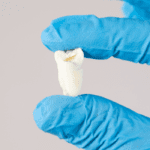Many people don’t look forward to dental visits. According to Harvard Health Publishing, approximately 13% to 24% of people across the globe suffer from fear of the dentist.
If you are one of them, we’ve made a list of the most common causes of dental fear, along with some coping options and treatments to help you overcome it.
What Makes Us Fear Going To the Dentist?
Dental anxiety is stress, fear, or anxiety linked to dental settings, resulting in avoidance and delays in dental visits and treatments.
Generally, dental settings are the most common trigger; however, it can also be triggered by:
1. Fear of Pain
Pain is among the most common reasons why people fear dental visits and treatments. It may be due to a previous painful experience with a dentist or another person’s painful experience.
2. Fear of Judgement
Being too self-conscious is another cause. Some people think their conditions are so severe that dentists might judge or accuse them of not practicing good dental hygiene.
3. Fear of Being Helpless or Not Being in Control
Not being able to see what dentists are doing in their mouths may cause fear for some people. They fear the thought of not being in control of the situation.
This can be due to previous unpleasant experiences, such as domestic violence or accidents that resulted in trauma to the neck or head.
4. Fear of Needles or Injections
For some people, the feeling of being injected with something–especially when it needs to be done in the mouth–makes them fearful of dentists. Some people get scared by the mere thought of needles.
5. Fear of Anesthetic Side Effects
Some people also fear the side effects of anesthesia, such as numbness, nausea, and dizziness. The thought of not knowing what can happen after receiving anesthesia still bothers some people, even if these side effects wear off quickly.
Signs and Symptoms
While some people feel scared of visiting dentists and receiving dental treatments, it doesn’t hinder them from regularly scheduling dental appointments. Here are some signs and symptoms to help you recognize if you have dental fear:
- Heart Palpitations
- Excessive Sweating
- Panic Attacks
- Crying
- Syncope
- Low Blood Pressure
- Aggressive Behavior
Dental Anxiety Management
Fortunately, there are many ways to manage your fears. You can undergo treatment or practice some coping mechanisms. Before you type “dental anxiety dentists near me” into the search bar, take a look first at some dental anxiety management options that might work for you:
1. Analgesics
Analgesics are pain relief medications available in drugstores. Aside from relieving pain, they also reduce moderate anxiety.
Usually, dentists use nitrous oxide, also known as laughing gas. It is an odorless and colorless gas breathed in before dental and medical procedures. If you have dental insurance plans, ask your provider if they offer coverage for analgesia.
2. Medication
Dentists also prescribe short-acting anti-anxiety medications to manage mild anxiety. Taking these medications at least an hour before dental visits can help boost feelings of calmness and relaxation.
3. Conscious Sedation
For mild to severe anxiety, conscious sedation is one option to manage your fear of the dentist. This won’t make you fall asleep during dental visits. Instead, it will make you feel relaxed while staying responsive and conscious.
4. General Anesthesia
One of the best options for dental anxiety management is general anesthesia. Patients are unconscious when under general anesthesia. Most of the time, anesthesiologists administer general anesthesia before procedures; however, dentists who have undergone training can also administer it.
5. Proper Communication With Dentist
During dental visits, try to communicate with dentists to relieve your anxiety. Tell them your concerns, and ask them to educate you about the procedures if it will help lessen your fears and make you more comfortable with them. After all, their goal is to help improve your condition, not to make you more frightened.
6. Breathing Exercises
According to an article from the University of Michigan Health System, breathing exercises help reduce stress and promote relaxation. To do this, close your eyes and breathe in slowly through your nose. Hold it for a couple of seconds, then breathe out through your mouth. Repeat these steps until you feel calm.
7. Muscle Relaxation and Meditation
Like breathing exercises, muscle relaxation and meditation can help you feel calmer during dental visits by focusing your mind and promoting calmness. Waiting for dentists to call your name can increase your anxiety, so you need to do something to ward off nervousness.
Close your eyes to meditate or focus on a particular object. Let your mind wander away from the thought of needles, pain, or whatever it is that triggers your anxiety.
8. Guided Imagery
Guided imagery is a simple relaxation technique that involves visualizing or picturing happy memories. Before and during your procedure, think of your favorite place or memory to help you feel relaxed. You can also think of funny memories to steer clear of negative thoughts.
According to one study, nostalgia isn’t a feeble escape but a source of strength. This just proves that guided imagery is among the most effective options for dental anxiety management.
9. Hypnosis
Hypnotherapy uses intense concentration, focused attention, and guided relaxation to enter a heightened state of awareness. While in a hypnotic state, hypnotherapists can help change your perceptions and curb anxiety. Don’t worry; they can’t make you do things you don’t intend to do.
10. Distraction
Distracting oneself is also a good way to deal with fear. Ask your dentist for different options, including television shows, movies, or music during dental visits and procedures.
11. Moral Support
Having a trusted relative or friend can also make some people feel more relaxed. If you think it can help effectively manage your anxiety, talk to your dentist about bringing someone with you to the exam room.
12. Other Options
Other ways to help manage your fear and anxiety are:
- Use hand signals with your dentists to let them know you need a break.
- Consult a psychologist.
- Promise yourself a treat after a dental visit.
- Arrange a meet-and-greet appointment to get to know your dentist.
Advanced Dental Group Is Here to Help
Now that you already know how to deal with dental anxiety, it’s time to schedule a dental visit. Advanced Dental Group has partnered with professional dentists from different states in the U.S. We can connect you to the best ones in your area. Our affiliate dentists can help you deal with dental fear, so contact us today for any inquiries.





